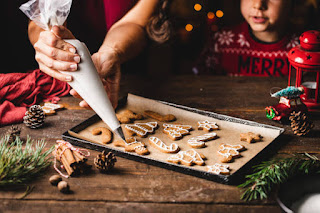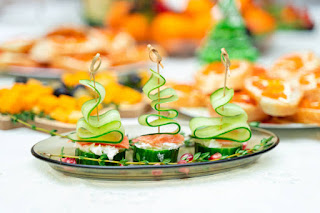Cookies, chocolate, mulled wine, and roasts: It just seems impossible to avoid gaining weight at Christmas. Learn how to enjoy the holidays without putting on extra pounds afterward.
Knowledge to take away
Gingerbread and stollen are already enticing in the Advent season, on the festive days there is festive cooking and feasting for body and soul. What tastes so good in December is noticeable on the scales in January at the latest. But how can you enjoy the most festive time of the year without gaining weight over the Christmas period? We have put together nine helpful tips for you.
1. Cleverly mix sweet dishes
Combine the sweet marzipan and chocolate delicacies with nuts and fruit. Walnuts, hazelnuts, and almonds also have a lot of calories, but no sugar and convince with inner values: Walnuts contain a particularly large number of omega-3 fatty acids, while hazelnuts shine with cell-protecting vitamin E. All nuts, but especially almonds, boast plenty of protein and fiber. This mix is particularly filling.
If you like it sweet, pimp the colorful plate with oranges or tangerines for a change. Fruit is the smarter alternative to speculoos and fills up the vitamin stores.
There are also differences when it comes to Christmas cookies. A piece of Christmas stollen can be a real figure trap with up to 400 kilocalories; on the other hand, meringues are egg white based and have the lowest calorific value.
Pay attention to the energy density when baking. The basis of many cookies is the rich shortcrust pastry. Here you can simply reduce the amount of fat; a maximum of half is possible. The dough will still be smooth if you add two to three tablespoons of milk. There is also potential for savings in sugar. Ground nuts in the dough provide valuable minerals and reduce blood sugar peaks.
NOTE!
Sweets can be chosen wisely. Prefer cookies with less sugar, rather snack on nuts and fruit from time to time. Make sure you use good ingredients when baking. Your body will be happy.
2. Spices instead of chocolate
Fat is a flavor carrier, and sugar is somehow too. Both taste delicious together, are soul food, and lure people everywhere during the Advent season - with the well-known result: weight gain at Christmas.
But not only chocolate makes you happy. Get in a good mood with aniseed, ginger, cardamom, vanilla, and cinnamon, and refine your breakfast, dessert, tea, or coffee with the spices. For example, vanilla can increase the level of the happiness hormone serotonin and put you in a good mood, while cinnamon warms and calms you down. Its essential oils, cinnamaldehyde, and eugenol, also make heavy food easier to digest.
If you like it spicy, season it with ginger. The root is not only supposed to relieve nausea and colds but can also cure gastrointestinal complaints. A cup of ginger tea before a meal can reduce the feeling of fullness after eating.
NOTE!
In winter, the season is particularly intensive, for example, breakfast, tea, or coffee. The aromas flatter the stomach and can lift the spirits.
3. Schedule a fish meal
When it comes to a classic Christmas feast, many tend to think of duck or goose. However, the traditional meal is anything but lightweight. A duck leg has 503 kilocalories, two potato dumplings 306, a portion of red cabbage 148, and gravy 104 kilocalories. That's 1061 calories for just one meal!
But it doesn't always have to be meat. Better serve salmon. The dish also makes a lot and burdens the calorie account significantly less. Another advantage: fatty cold-water fish such as salmon, herring, halibut, and mackerel have omega-3 fatty acids. These keep our blood vessels supple, protect against cardiovascular diseases, are important for our brain, and reduce inflammation. Cod, plaice, saithe, and zander are also good fish. These fish do not contribute as many omega-3 fatty acids but are particularly low in fat.
NOTE!
Plan some fish over the holidays. Salmon, herring, or cod are not only tasty, but they are also kinder to your figure and very healthy.
4. Healthy side dishes
If possible, plan a small salad to start your meal. The starter fills the stomach with its high volume so that you don't eat as much with the main course. A smart basic age form winter salads such as chicory, endive, and radicchio. The bitter substances it contains stimulate digestion by stimulating the formation of gastric juice and bile.
Artichokes are also a good choice because they prevent gas, bloating, and nausea. Have a raw food platter ready so you can nibble on something fresh instead of cookies.
Then eat a little fewer dumplings, potatoes, or puree for the main course and fill half your plate with vegetables.
NOTE!
The crunchy appetizer already fills you up, so you eat less of the main course. Anyone who relies on chicory, endive, or radicchio also gets a lot of bitter substances that stimulate our digestion.
5. Drink with meals
The fear that drinking while eating dilutes stomach acid is unfounded. Instead, a glass of water – before and during meals – contributes to stomach stretching and thus indirectly to satiety. Whether sparkling or not is a matter of taste.
We often confuse hunger with thirst. Then we feel an appetite, even though the body needs liquid. It is therefore advisable to first empty a glass of water when the cabbage vapor appears and wait to see whether the supposed feeling of hunger persists.
NOTE!
Drink enough water. This can ensure that the first feeling of hunger is reduced and that less is eaten in the next meal.
6. Be careful with alcohol
For many people, Christmas and mulled wine simply belong together. But the mix of alcohol and sugar causes our blood sugar and insulin levels to rise enormously, which puts a strain on our metabolism and liver. Stick to a mug and skip the shot if possible.
It's smarter if you make the hot drinks yourself, preferably without alcohol. How about a non-alcoholic glögg or children's punch? The saving trick also works when toasting with a mocktail.
NOTE!
Mulled wine, Glögg, and Co. are not exactly figure flatterers due to the combination of alcohol and sugar. If you don't want to do without, you can prepare the hot drinks yourself, preferably without alcohol.
7. Create a balance
Even if feasting and snacking are fun, a balance is important. Otherwise, you run the risk of gaining weight over Christmas. It's best to skip dinner one day before the planned celebratory menu, put in a fitness DVD in between, and really work out.
Not only the dinner cancellation is a relief option. Have you ever tried intermittent fasting? With the 16:8 method, you allow a 16-hour meal break between dinner and breakfast. You can eat normally for the remaining eight hours. Another option is the 5:2 method, in which you eat normally five days a week and severely restrict your calorie intake two days a week.
Or start the morning with a slice of whole-grain bread and an apple. The whole grain ensures long-lasting satiety and a balanced insulin level. And the vitamins and minerals in apples regulate intestinal activity. Tip: Be sure to eat the bowl as well. This and just below it contain 70 percent of the valuable ingredients.
NOTE!
There is a lot to feast on in December. Try to find the right balance here and relieve your body, for example with dinner-canceling or intermittent fasting
8. Just get out into the fresh air
Enjoying
the days off together with friends and family - that's nice. But do you really only have to sit and eat together? Instead, just slip on your coat and march through the neighborhood or into nature. Incidentally, the feel-good hormone serotonin needs bright light, preferably natural light.
The ideal time for a walk is therefore midday when the sun is at its highest and even when the sky is cloudy, the emissions are boosted by the happiness maker. The sleep hormone melatonin also needs a clear alternation between day and night, otherwise, we constantly feel tired or suffer from insomnia. And, of course, the exercise burns calories at the same time.
NOTE!
Fresh air and daylight are so important in winter. It will do you and your body good.
9. Avoid stress
Buying souvenirs, decorative items, and groceries quickly, planning visits and dishes in your head - the holidays can turn into quite a bit of stress. Due to a lack of time, not only sport and exercise are left behind; often, when we don't think about it, we reach for sweets.
It's better to shift down a gear and look for small escapes. Yoga, a hot bath, or reading provide more balance. You can also put on a meditation CD or calmly cook a nice meal.
So that you don't get too much when you're getting hectic: ban sweets from your area. Away with it in Schr benches and chests of drawers! It is best to go all the way up, all the way to the back; Mainly difficult to access.
NOTE!
Try to avoid stress and treat yourself to some downtime with yoga, meditation, or reading.
Knowledge to take away
Gain weight over Christmas? So that this doesn't happen, you have to enjoy it with your head. It starts with the recipes, but also with the menu planning. Rely on nuts, spices, fish, and salad as a starter. Also, consider the side dishes. Mulled wine with a shot? Better not! Alcohol-free variants ensure figure-friendly enjoyment.
Don't just try to find the right mix of foods, but also give your digestion a breather. This can be done with dinner-canceling or intermittent fasting. Try to avoid stress and recharge your batteries with yoga, reading, or a walk. Physical activity not only burns one or the other speculoos but also puts you in a good mood. Get through the holidays healthy.









